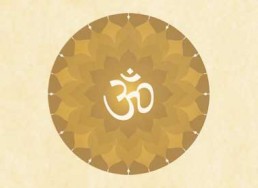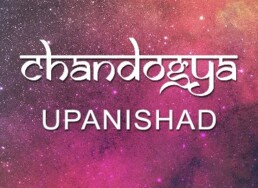Na Karmana Na Prajaya
परेण नाकं निहितं गुहायां विभ्राजते तद्यतयो विशन्ति ॥
pareṇa nākaṃ nihitaṃ guhāyāṃ vibhrājate tadyatayo viśanti ..

Description
Who are they who gain this amṛtatva? Tyaginah. Tyagena eke präptavantah, by renunciation some gain. Eke in the plural means a few people. By what means? Tyagena, by tyaga. Tyaga is renunciation for the sake of knowledge. These are sannyasins who have renounced to gain knowledge, to gain moksha. Sannyasa is praised in this mantra. The mantra will explain this further.
Na karmanā, not by karma. One can gain moksha only by knowledge. Karma will bring karmaphala, results, but karma is finite and therefore, karmaphala is also finite. The limited person plus the limited result born of limited karma will continue to be limited. A finite number when added to a finite number will still be a finite number. Therefore, na karmanā, there is no way of getting moksha through karma.
Can karma-yoga lead to moksha?
Yes, you can gain knowledge by karma-yoga, in that it prepares you for knowledge. It is not just another form of yoga. We mistakenly think that we will perform karma-yoga. Nobody can ‘do’ karma-yoga. There is no particular action called karma-yoga. Some people believe that in giving as charity or in doing some sevā, they are doing karma- yoga. Karma-yoga is only possible when your goal is moksha, and the entire life is one of proper attitude. For instance, your conduct and duties in marriage or parenting are also part of karma-yoga. You can thus convert your activities in life into a means for your own growth; that is karma-yoga.
Na prajaya, not by progeny. Na dhanena, not by wealth. There are predominant desires such as the desire for wealth, fame, and power in this world, and the desire for the heavens, etc. Punya-karma is dharma, dhana is artha, and praja is käma. Dharmartha-kama is not moksha. You have to deliberately choose mokşa. Dharma is useful in that it becomes a basis for conducting your life, and then the whole life becomes yoga.
Paramānanda is attained by renunciation
Tyagenaike amṛtatvamanaśuh. Only by tyaga, renunciation of karma, can you gain mokşa. Not doing karma is not renunciation. Even while performing karma, you should discover that you are actionless. That is akarma. You can gain moksha only by knowing that the atman is akartr and that it is Brahman.
Parena nākam. Kam means happiness, su-kham. Even without the prefix ‘su,’ kham means happiness. Akam is na sukham, that is duhkham. Na akam is the absence of duhkha. Akam na vidyate yasmin tad nākam, that in which there is no duhkha is nākam. Nakam is the sukha of heaven, which is mentioned in the Vedas. It is anitya, lasting only for a finite period. Parena nākam means more than the heavenly sukha. It is ananda, limitless. It transcends svarga; it transcends the absence of duhkha and is in the form of ananda, untouched or uninhibited by duhkha. It is paramananda.
Ignorance veils the Lord’s presence in the intellect
Guhayām nihitam-that which obtains as yourself, the atman in your buddhi-guha. Guha means cave. By definition, guha is dark; it stands for darkness. The Lord obtains in the buddhi in the form of ananda, limitlessness or fullness, as the svarüpa or very nature of the atman. However, you do not recognise it due to ignorance. Its presence is hidden for want of light. Therefore, the faculty of knowledge, the buddhi, is called guha.
Brahman is not hidden because everything is Brahman. The knower is Brahman, the knowledge is Brahman, and the known is Brahman. Every thought isBrahman; nothing is outside Brahman. Therefore, Brahman cannot be hidden by anything. One of the Upanişad says that if a person could cover space with a cloth, he would cover Brahman! This means all that is here is Brahman. Even while you say, “I don’t know Brahman,” it is Brahman that is talking to me. It is as self-contradictory as saying, “I have no tongue,” or “I am dead.” This is denial of Brahman. You cannot deny Brahman because you are Brahman. If everything is Brahman, how is it that you do not appreciate this fact? This is because it is a question of knowing it, and not a question of believing so. This knowledge is not hidden, but veiled due to ignorance and therefore, the buddhi is called guha.
The buddhi is dark with respect to Brahman, the most obvious. If you have not seen an object, it is out of sight and, therefore, out of mind, but Brahman, being oneself, is never out of sight; it never goes out of mind. Therefore, it is our ignorance that conceals its presence.
Yad vibhrājate, that which shines. It is that which shines in the form of ananda, the atman, consciousness. Vividham bhrājate, or viseşena bhrājate. In the form of this entire jagat, that ananda alone is shining all the time on the platform of one’s buddhi as jñātr-jñāna-jñeya, the knower, knowledge and the known. Otherwise, how does one recognise any thing? Everything is in the buddhi. All these galaxies ‘out there’ are ‘in here’ within our buddhi.
The sannyasins committed to knowledge ‘gain’ paramananda
Yatayah visanti. Yatayah is the plural form of yatih. A yati is yatna-śīlah, one who puts in the right effort. This can mean anybody. Even a karma-yogin is a yati. Yati also means seeker, a mumukṣu. The rūdi, conventional meaning of yati, however, is sannyäsin. This meaning is more popular. The effort of these yatayah, sannyasins or mumuksus, is made for the sake of moksha, mokṣārtham yatnam..
Visanti, labhante, they gain. Yad vibhrājate tat yatayah visanti, the sannyäsins attain this shining, pure ananda.
Excerpt from the book ‘Prayer Guide’ by Swami Dayananda Saraswati
Other Om Shlokams
Anantam Vasukim Sesham
Anantha, Vasuki, Sesha, Padmanabha and Kambala, Shankapala, Dhritharashtra, Thakshaka and Kaliya are the names of nine great serpents
Ashtavakra Gita
Ashtavakra Gita - Full text and lyrics, audio with translation, meaning, word-by-word meaning, Sanskrit, English, Telugu, Kannada, Tamil and more
Bali Vibhishano Bhishma
Bali, Vibhisana, Bhishma, Prahlada, Narada, Dhruva - these are the six famous Vishnu-bhaktas - meditating upon all of these, will destroy sins.
Chandogya Upanishad All Verses
Chandogya Upanishad This is the English translation of the Chandogya-upanishad, including a commentary based on Swami Lokeswarananda’s weekl
Dharmo Vivardhati Yudhishtira
Dharma grows with the praise of Yudhistira, sins die with the praise of Bhima, enemies are extinguished with the praise of Arjuna, there will be no ill-health with the praise of Nakula and Sahadeva.
Harim Haram Harishchandram
Hari, Hara, Harischandra, Hanuman, and Halayudha (Balaram), if these five 'Ha's are meditated upon, when getting up from the bed in the morning, there will not be even a touch of harm.
Kaivalya Upanishad All Verses
The Kaivalya Upanishad is a short yet profound text in Vedantic literature, classified among the minor Upanishads, yet carrying the essence of the highest spiritual teachings. It belongs to the Atharva Veda and is deeply revered in the Advaita…
Kapilam Darpanam
Upon waking one should see the Sun, mirror, cow, prosperous people, kings, teachers and donors of food.
Kapilam Kamadhenum Ca
May we meditate on Kapila, Kamadhenu, Kalpavriksha, Kaustubha(gem), Lakshmi, the daughter of the ocean, Kubera and Moon.
Karkotakasya Nagasya
Singing in praise of the Karkotaka serpent by Damayanthi for Nala, and in praise of Raja-rishi Rutuparna - led to the destruction of Kali.
Mandukya Karika
The Mandukya Karika represents the first systematic philosophical exposition of Advaita Vedanta, transforming the concise twelve-verse Mandukya Upanishad into a comprehensive 215-verse treatise on non-dual philosophy.
Mandukya Upanishad All Verses
Mandukya Upanishad - A detailed Summary The Mandukya Upanishad is the shortest yet one of the most profound Upanishads, consisting of just 12 verses. It explores the n
Mulato Brahmarupaya
To you, O Vriksharaja (King of trees) who takes on the form of Brahma at the roots, Vishnu in the middle and Shiva at the extremes, our salutations
Mule Brahma Tvaci Vishnu
Brahma is at the root, Vishnu is in the bark and Sankara is in the branches, all devas are in each and every leaf. Salutation to you O Vaasudeva.
Na Tatra Suryo Bhati
Neither does the sun shine there, nor the moon with all the stars, nor does this lightning shine. What to say of this fire? Everything shines after him who alone shines. By His light all this shines v
Omkaram Bindu Samyuktham
Yogis meditate forever on Aumkara associated with the Bindhu, salutation to the Aumkara, the grantor of wishes and salvation. We call on Thee, Lord of the hosts, the poet of poets, the most famous of
Prahlada Narada
I remember and meditate upon the Bhagavathas (god's ardent devotees) Prahlada, Narada, Parasara, Pundarika, Vyasa, Ambarisha, Shuka, Shaunakha, Bhishma, Rukma, Angadha, Arjuna, Vashishta, Vibhishana -
Prātah Smaranam
Pratah Smaranam is a prayer composed by Sri Adi Shankaracharya consisting of three stanzas in which the mind (manas) speech (vak), and body (kaya) of the individual are
Punya Shloko Nalo raja
Extolled for their virtues are King Nala, Yudhishtira, Sita and Janardhana
Purna Kumbha Mantra
Pūrna-kumbha mantra The four verses of the purna-kumbha-mantra, from na karmanā na prajayā to yah parah sah maheśvarah,are typically chanted when
Purusha Suktam
The Purusha Suktam gives a description of the spiritual unity of the universe. It presents the nature of Purusha, or the cosmic being, as both immanent in the manifested world and yet transcendent to
Rajadhi Rajaya Prasahya
Om. We offer our salutations unto the Lord, the king of kings, the satisfier of desires. May the Lord of desires give me, the seeker of desires, what I desire. Salutations unto the Lord, the great kin
Sanyasa Suktam
Excerpt from the book 'Prayer Guide' by Swami Dayananda Saraswati NA KARMANA Amrtatvam anasuh, amrtatvam anasire praptavantah, these people have gained immortality or freedom
Sarve Veda Yatpadam
All the Vedas talk about which goal, to know which, people take to a life of study and spiritual discipline, I tell you in brief - that is om.
Yani Kani Ca Papani
Yani Kani Ca Papani - Oh god! Whatever sins I have committed all my lives (including previous lives), please destroy them with every step I take around you. - In Sanskrit with Audio, in multiple languages with English Meaning and Significance.
Na Karmana Na Prajaya – Om – In Sanskrit with English Transliteration, Translation and Meaning. Commentary for selected Shlokams. With commentary by Swami Dayananda



